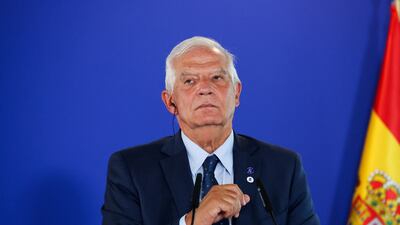The European Union aims to follow in the footsteps of the West African regional body Ecowas and slap the same sanctions on the junta that seized power in Niger several weeks ago, the bloc's foreign policy chief Josep Borrell said on Wednesday.
"We will follow, trying to implement the same kinds of sanctions that they have decided," he said after a meeting of EU defence ministers in Toledo, Spain.
"We are moving forward for an autonomous sanctions regime to take measures against the putchists," Mr Borrell said during a joint press conference with Spain's Minister of Defence Margarita Robles.
"Work has already started and tomorrow, foreign affairs ministers will advance on that," he added, in reference to an informal meeting of EU foreign affairs ministers on Thursday.
The meeting, also to be held in Toledo, will be attended by the president of Ecowas, Omar Touray, as well as Niger's foreign affairs minister in exile Hassoumi Massaoudou, Mr Borrell said.
"We will have a conversation in person," Mr Borrell said.
Ecowas sanctions, issued on July 30, include the freezing of Nigerien assets and a ban on commercial flights.
Nigeria, which has the fourth largest army in Africa, has led the Ecowas response to the coup. The alliance has 11 active members.
The EU, one of the biggest providers of aid to Niger, last month suspended security co-operation and financial support that had been set at €503 million ($552 million) in 2021-2024 to help improve governance and education.
Niger's President Mohamed Bazoum, who was democratically elected in 2021, is still under house arrest with his family in Niamey.
The EU's European External Action Service, headed by Mr Borrell, recently recommended establishing an autonomous EU sanctions regime against Niger, according to an internal document seen by Politico.
It would be based on criteria targeting “natural and legal persons being responsible for, or providing support to or having engaged directly or indirectly in actions or policies that undermine democracy and the rule of law in Niger", the news website reported.
It also suggests targeting officials that “obstruct or undermine efforts to restore the constitutional order”.
Political instability in West Africa was high on the agenda of defence ministers on Wednesday, following news of a military coup in Gabon shortly after disputed elections in which President Ali Bongo Ondimba, in power since 2009, was declared the winner.
Mr Borrell said that news of the coup "took us all by surprise this morning".
Responding to a question about a possible evacuation of European citizens from Gabon, Mr Borrell said: "we’ll do with Gabon what we did for Niger or any country where our citizens need assistance".
He had previously said that another military coup would "increase instability in the region".
"The whole area, starting with the Central African Republic, Mali, Burkina Faso, now Niger and maybe Gabon is in a very difficult situation," he said on arrival.
He said that defence and foreign affairs ministers would have to reflect on how to improve European policies in those countries.
"This is a big issue for Europe."
Alongside Mr Borrell, Ms Robles said that Spain, which currently holds the EU presidency, will carry out an "integral analysis of the situation in Niger and now Gabon".
"We have to look at the full picture when it comes to deciding the future of our military missions," Ms Robles said.
Spain has about 140 troops stationed to the north-east of Mali's capital, Bamako, where they are part of the EU's training mission there.


